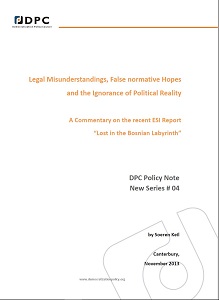DPC POLICY NOTE 04: Legal Misunderstandings, False normative Hopes and the Ignorance of Political Reality. A Commentary on the recent ESI Report “Lost in the Bosnian Labyrinth”
DPC POLICY NOTE 04: Legal Misunderstandings, False normative Hopes and the Ignorance of Political Reality. A Commentary on the recent ESI Report “Lost in the Bosnian Labyrinth”
Author(s): Soeren Keil
Subject(s): Constitutional Law, Inter-Ethnic Relations, Ethnic Minorities Studies
Published by: DPC Democratization Policy Council e.V.
Summary/Abstract: The European Stability Initiative recently published a troubling report on Bosnia and Herzegovina (BiH) called “Lost in the Bosnian Labyrinth - Why the Sejdić-Finci case should not block an EU application.”1 ESI argues that “non-implementation of the Sejdić-Finci decision cannot justify blocking Bosnia and Herzegovina’s application for EU membership,” noting that the reforms the EU expects from Bosnia have not been required of other EU applicants, much less its own member states.2 ESI argues that a ground-breaking legal ruling by the European Court of Human Rights (ECHR)3 should not impede Bosnia’s integration into the EU, but instead the EU should quickly give BiH candidate status and expect the constitutional revisions demanded by the ECHR to take place while BiH negotiates with the EU about membership. The paper justifies this with the claim that other countries (including EU member states) include de facto discriminatory provisions in their constitutions and are not sanctioned by the EU or the Council of Europe. // As will be shown in this text, that argument is not only highly flawed, but also demonstrates a troublingly lack of understanding of the fundamentals of BiH politics, as well as constitutional power-sharing arrangements in the member states of the EU. As such, the paper appears to be an effort to provide an ideological framework for the EU to move beyond its continuing failures in BiH that have enabled local politicians to undo many of the highly-touted reforms put in place prior to 2006, when the EU assumed policy leadership. If Brussels uses the ESI paper as ideological justification for dropping conditionality, it would enable the Brussels bureaucracy to move ahead with its “one size fits all” cookie-cutter enlargement policy and pretend that “progress” is occurring, when at best a standstill can be observed, and at worst, previous achievements are slowly being reversed by local party elites.
Series: DEM. POLICY COUNCIL - Policy Notes
- Page Count: 9
- Publication Year: 2013
- Language: English
- Content File-PDF

